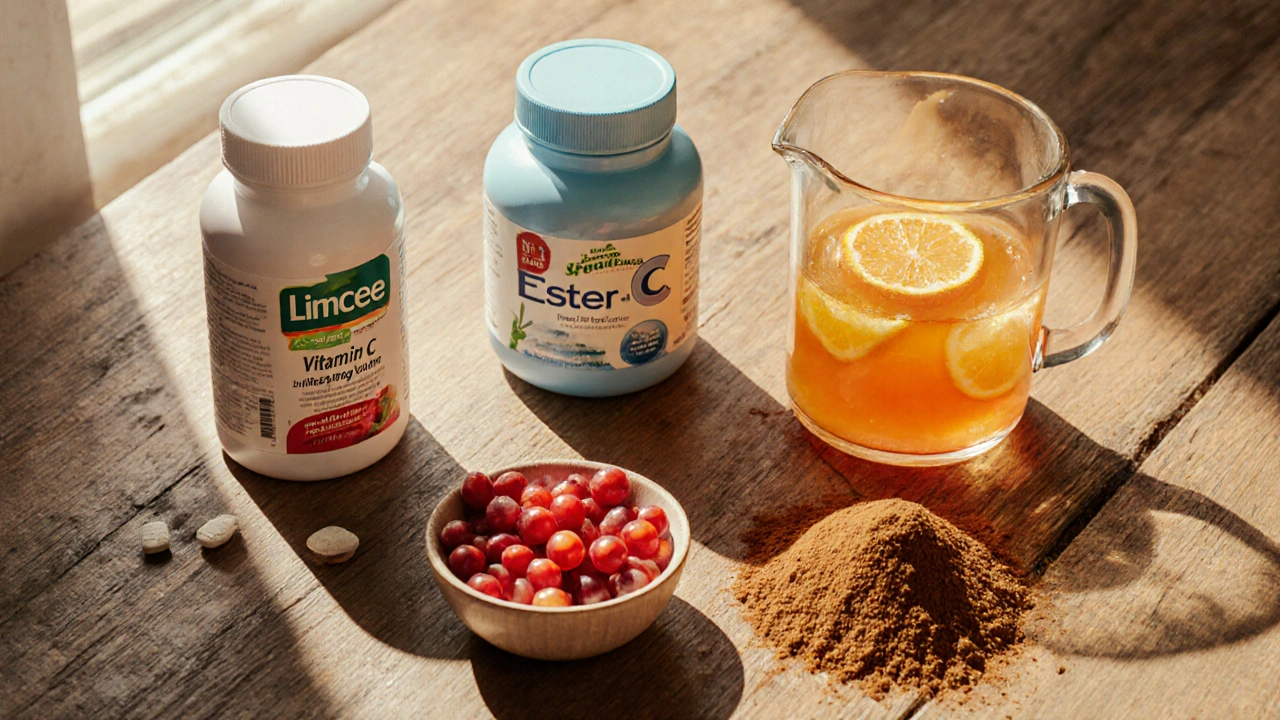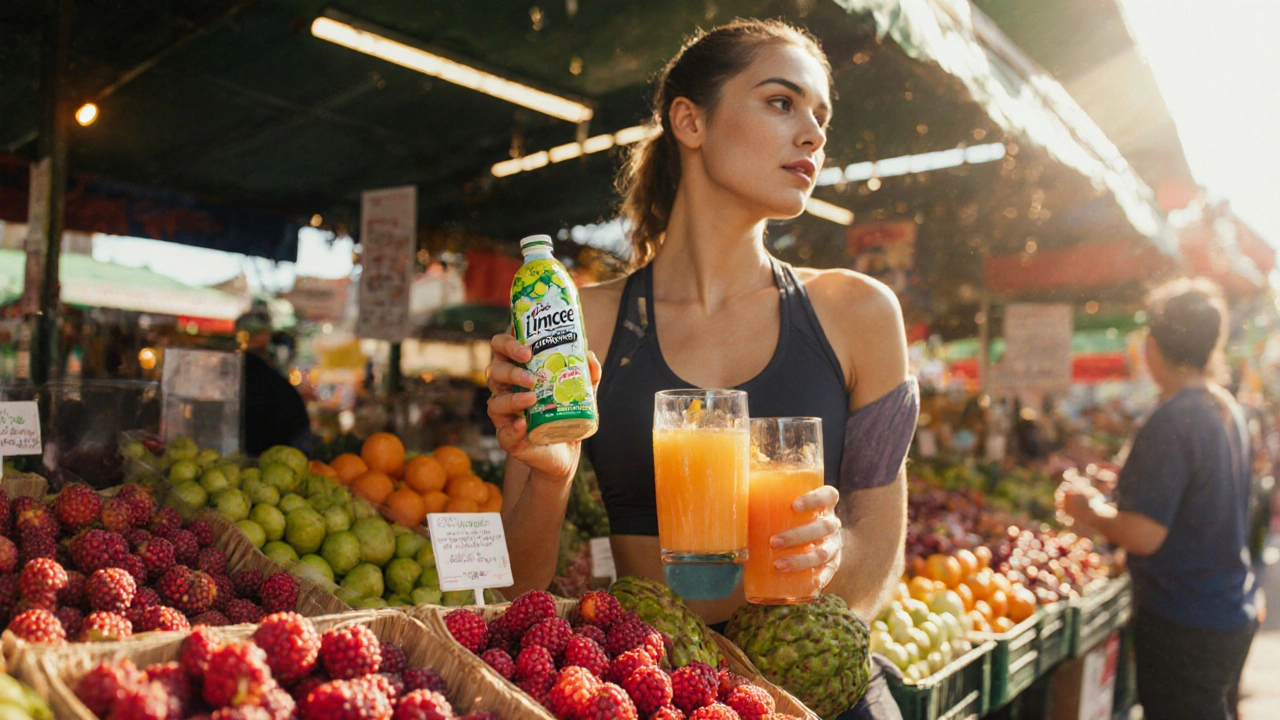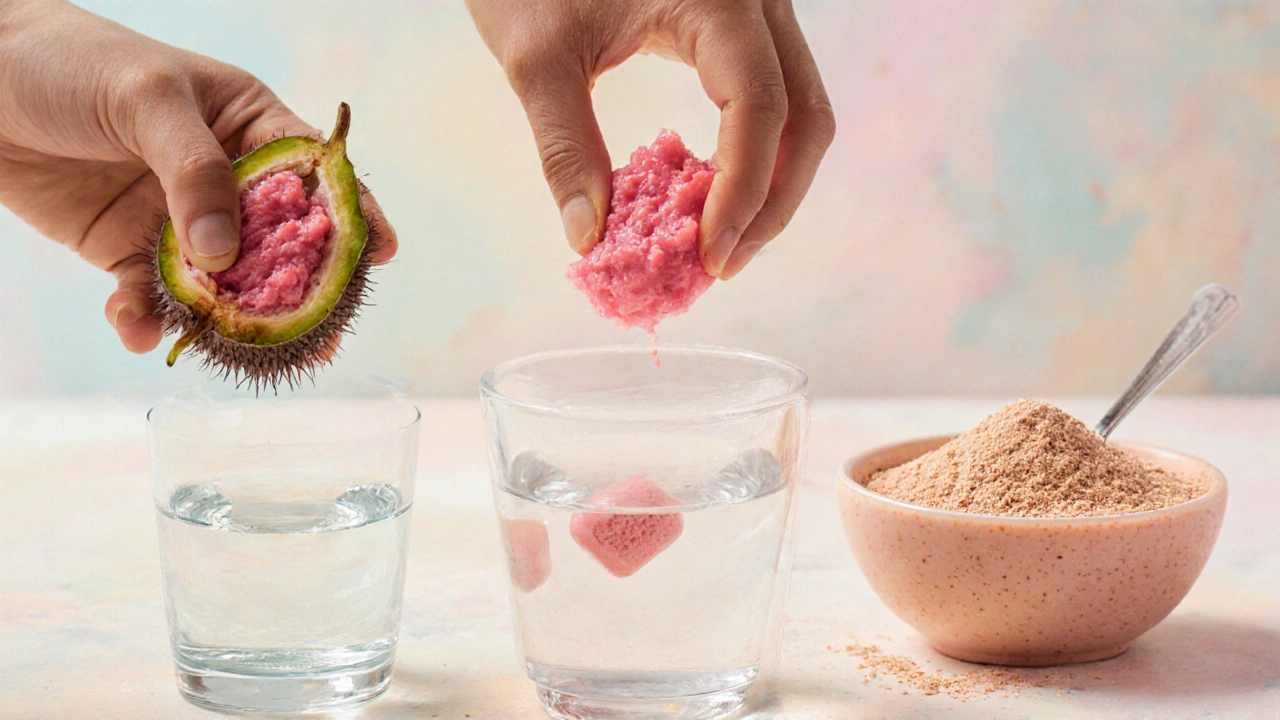Limcee vs Other Vitamin C Options: Which Works Best?
 Sep, 28 2025
Sep, 28 2025
Vitamin C Daily Intake Calculator
Find your personalized vitamin C dosage based on your lifestyle and health goals.
When it comes to boosting your daily vitamin C intake, the market is flooded with choices-from bright orange tablets to exotic fruit powders. If you’ve ever wondered how Limcee stacks up against other popular sources, you’re in the right place. This guide walks you through the key differences in form, absorption, taste, price, and ideal use‑cases, so you can pick the option that matches your lifestyle and budget.
Quick Takeaways
- Limcee is a synthetic ascorbic acid tablet known for fast absorption and low cost.
- Ester‑C offers buffered vitamin C with gentler stomach impact.
- Natural fruit powders (acerola, camu camu) provide added antioxidants but cost more.
- Choose citrus juice for everyday convenience; choose powders for targeted supplementation.
- Watch dosage: 500mg-1000mg daily is typical, higher amounts may cause digestive upset.
What Is Limcee?
Limcee is a brand of synthetic ascorbic acid tablets marketed as an affordable, fast‑acting vitamin C supplement. Originating in Japan, each tablet usually contains 500mg of pure ascorbic acid, a form identical to the vitamin C you’d find in a lab.
Key Alternatives to Consider
Below are the most common competitors you’ll encounter on pharmacy shelves or health‑food aisles.
Ester‑C is a buffered form of vitamin C that combines calcium ascorbate with a small amount of ascorbic acid, resulting in a milder impact on the stomach.
Acerola Cherry Powder is a natural source derived from the dried fruit of the acerola plant, delivering up to 1670mg of vitamin C per gram along with flavonoids and carotenoids.
Camu Camu Powder comes from the Amazonian camu camu berry, offering roughly 2800mg of vitamin C per gram and a high level of anthocyanins.
Citrus Fruit Juice (orange, lemon, grapefruit) provides natural vitamin C along with bioflavonoids that aid absorption.
How Do These Options Compare?
| Source | Form | Bioavailability* | Typical Dose | Price (USD per 100mg) | Taste/Convenience | Best For |
|---|---|---|---|---|---|---|
| Limcee | Tablet (synthetic ascorbic acid) | High (≈90%) | 500mg-1g | 0.04 | Neutral, easy to carry | Budget‑conscious daily boost |
| Ester‑C | Buffered tablet (calcium ascorbate) | Moderate‑High (≈85%) | 500mg-1g | 0.07 | Mild taste, gentle on stomach | Sensitive stomachs, high‑dose users |
| Acerola Cherry Powder | Dry powder (natural) | High (≈95%) | 1g (≈1670mg vitamin C) | 0.12 | Slightly tart, mixes in water/juice | People seeking antioxidant combo |
| Camu Camu Powder | Dry powder (natural) | High (≈95%) | 1g (≈2800mg vitamin C) | 0.15 | Sour, best blended | High‑potency users, antioxidant lovers |
| Citrus Fruit Juice | Liquid (natural) | Moderate (≈70%) | 250ml (≈70mg vitamin C) | 0.02 | Refreshing, everyday drink | Casual consumers, kids |
*Bioavailability percentages are based on peer‑reviewed studies from 2022‑2024 that measured plasma ascorbate after a single dose.

Factors That Influence Your Choice
- Cost per milligram: Synthetic ascorbic acid tablets like Limcee win on price, especially when you need to stay under $10 a month.
- Stomach tolerance: Buffered forms (Ester‑C) reduce the risk of acid‑related discomfort, which matters for people with sensitive digestion.
- Additional nutrients: Natural powders bring flavonoids, carotenoids, and anthocyanins that may boost immune function beyond vitaminC alone.
- Convenience: Tablets are pocket‑friendly, while powders need a shaker bottle. Juice is ready‑to‑drink but requires refrigeration.
- Dosage flexibility: Powders let you dial in exact milligram amounts; tablets come in fixed doses.
Practical Scenarios and Recommendations
- Everyday maintenance on a tight budget: Stick with Limcee tablets. Two 500mg tablets a day cover the recommended 1000mg intake without breaking the bank.
- High‑intensity training or frequent travel: Combine Limcee with a citrus juice in the morning for rapid absorption and a refreshing start.
- Sensitive stomach or nutrient‑stacking: Choose Ester‑C. Its calcium base prevents the sharp acidity that can cause heartburn.
- Looking for a full antioxidant package: Mix a half‑teaspoon of acerola cherry powder into a smoothie. You’ll get vitaminC plus bioflavonoids that support skin health.
- Maximum potency for immune support during flu season: Camu camu powder delivers a higher vitaminC dose per gram, ideal for short‑term high‑dose protocols.
Potential Side Effects and Safety Tips
All vitaminC sources are generally safe, but dosage matters. Exceeding 2g per day can lead to:
- Stomach cramps or diarrhea (more common with pure ascorbic acid tablets).
- Kidney stone formation in susceptible individuals.
- Interference with certain medical tests (e.g., blood glucose readings).
To stay safe, start with 500mg daily, monitor how your body reacts, and scale up only if you tolerate it well. People on blood thinners or with iron‑overload conditions should consult a healthcare provider before high‑dose vitaminC.
How to Store Your VitaminC Supplements
VitaminC breaks down when exposed to heat, light, and moisture. Keep tablets in a dry container away from direct sunlight. Powders should be stored in an airtight jar in a cool pantry. Fresh juice is best consumed within 48hours of squeezing to preserve ascorbate levels.
Bottom Line: Which One Wins?
If you’re after pure, affordable, fast‑acting vitaminC, Limcee remains the go‑to. For those who need extra stomach comfort, Ester‑C is the gentle alternative. When you want the antioxidant entourage that comes with whole foods, acerola cherry or camu camu powders are worth the extra spend. And never underestimate the simple power of a glass of orange juice for everyday health.

Frequently Asked Questions
Is synthetic ascorbic acid as effective as natural vitaminC?
Yes. Chemically, ascorbic acid is identical whether it’s made in a lab or extracted from fruit. The body absorbs both forms equally, assuming the dose isn’t too high to cause gastrointestinal irritation.
Can I mix Limcee tablets with fruit juice?
Absolutely. Dissolving a tablet in 200ml of orange juice improves taste and adds natural bioflavonoids, which may enhance absorption.
How much vitaminC should I take daily?
The recommended dietary allowance (RDA) for adults is 75mg for women and 90mg for men. Many health professionals suggest 500mg-1000mg for immune support, especially during cold season.
Will high doses of vitaminC cause kidney stones?
In rare cases, excessive vitaminC (over 2g daily) can increase oxalate excretion, which may contribute to stone formation in predisposed individuals. Stay below 2g unless supervised by a doctor.
Is there any benefit to taking vitaminC in the evening?
VitaminC is water‑soluble and doesn’t interfere with sleep. Some people prefer evening dosing to avoid stomach upset during the day, especially with buffered forms like Ester‑C.

Elliott Jackson
September 29, 2025 AT 22:23McKayla Carda
October 1, 2025 AT 15:11Christopher Ramsbottom-Isherwood
October 3, 2025 AT 06:49Stacy Reed
October 3, 2025 AT 11:00Robert Gallagher
October 4, 2025 AT 17:00Howard Lee
October 5, 2025 AT 04:37Nicole Carpentier
October 5, 2025 AT 06:59Hadrian D'Souza
October 6, 2025 AT 10:25Brandon Benzi
October 7, 2025 AT 02:09Abhay Chitnis
October 7, 2025 AT 02:17Robert Spiece
October 8, 2025 AT 17:03Vivian Quinones
October 8, 2025 AT 20:08Eric Pelletier
October 9, 2025 AT 05:39